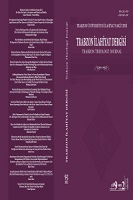Fetvahânenin Hazırladığı Muhîtu’l-fetâvâ’da Yer Alan Akaid Fetvaları ve Kaynakları
Aqaid Fatwas and Their Sources in the Muhîtu’l-fatawa Prepared by the Fatwa Office
Author(s): Emine ArslanSubject(s): Islam studies, The Ottoman Empire, Sharia Law
Published by: Karadeniz Teknik Üniversites - İlahiyat Fakültesi
Keywords: Islamic Law; Aqaid; Fatwa; Ottoman Empire; Muhîtu’l-fatawa;
Summary/Abstract: Despite their close relationship at the beginning, fiqh and aqaid developed separately from each other over time. However, some issues of aqaid continued to be covered in the sirah section of the books of furu' al-fiqh (branches of jurisprudence) and in the issues related to husn and qubh (good and evil) in the usul (source methodology in Islamıc Jurisprudence) books. In addition, since the issues of aqaid continued to be asked in the form of fatwa like other fiqh issues, it continued to take place in fatwa books more or less. In the last period of the Ottoman Empire, when the Teʹlîf-i Mesâil (editorial board) Branch was established in the Fatwa Office to prepare a large Turkish fatwa collection called Muhîtu’l-fatawa, the first book of this collection was devoted to the subjects of aqaid. One hundred and two fatwas in the subject of aqaid of the collection of which only taharah and salah books could be prepared apart from Aqaid, consist of selections from the fatwas of Ottoman sheikh al-Islam and scholars on these issues. Fetâvâ-yı Veliyyüddîn, which mainly includes the fatwas of Ebussuûd Efendi, Ali en-Nisârî's work named al-Fevâid al-aliyye and Osman b. Mehmed Tosyevî’s al-Fetâvâ'l-Osmâniyye and Yenişehirli Abdullah Effendi’s Behcet al-fetava are the most popular fatwa books in the collection appear to be prominent. One of the duties of the board that prepared Muhîtu’l-fatawa is to review the authenticity of the narrations in the works from which the fatwas were taken, to make additions when necessary, and sometimes to introduce completely different narrations. In this respect, the nuqul, which are the evidences of the fatwas in the collection, also provides important data on which works on aqaid were regarded as acceptable in the Ottoman Empire. It is also noteworthy for Muhîtu’l-fatawa that Fatwa Office found the power and responsibility to prepare a great fatwa collection even in the frost period of the Ottoman Empire, and that it started this collection with the Aqaid book and went over the framework of the official akidah/theology thought system in this chapter, perhaps for the last time. For this reason, in this article, it will be tried to determine the nature of aqaid fatwas as a product of fatwa activity within the framework of Muhîtu'l-fatawa and what books are referenced in these fatwas.
Journal: Trabzon İlahiyat Dergisi
- Issue Year: 9/2022
- Issue No: 2
- Page Range: 32-60
- Page Count: 29
- Language: Turkish

